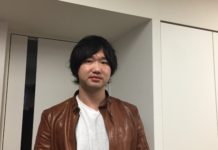Anytimes Founder and CEO, Chika Tsunoda, set foot with a very simple vision for her startup: develop local communities. In an age where online communities are determined by how many friends you have on Facebook,Anytimes is looking to change our modern perception of community while improving society, by bringing people together through skill sharing. How it works is very simple: Users can either offer their services for a fee they set or give notice to other users for a service they are looking to procure; matching, communication, and payment between the two parties is done directly in the app.
Taking a rather unconventional path into the world of startups, Tsunoda-san eloquently spoke to us about her service as well as how she got her start.
– Please tell us about your company.
We provide a skill sharing economy service, where we match users requesting services to users who offer their skill for spare time work. Practically any skill can be shared such as taking care of pets, cleaning, teaching English, knitting, etc. Basically, there is no registration or monthly fee, but instead we charge a 15% service fee after the matching is complete. Users have a choice of send requests for services or offer services of their own to the community. For example, a user can post a request to the open community board as such as “I am going on vacation next week. Is there anyone who could take care of my pet for 5000 yen while I am away?”—we then match them with the first user who is able to take on the job. After the matching is complete, the two users can communicate directly through the app to work out the details.
A user can not only offer their skills written on their profile, but can also create tickets with expiration dates for their services. For example, a user can create a ticket that reads, “I will make ramen for you. 1000 yen. Location: Tokyo. This ticket good until xx/xx. Same day payment, ok”. A user is free to make multiple tickets open for purchase in the community.
Services are paid for by credit card only and are settled directly in the app.
We are currently working a new beta version of our app which will be available in English and Japanese. Apart from the request for services/offer for services layout on the app, all users are able to view comments on the board and post questions.
Our main goal is to change society by providing individuals a platform, not bound by the confines of traditional society or a fixed concept, where they can maximize their time and have the freedom to contribute their skills to the community.
– Do you conduct skill checks?
Basically, we leave it to the individual to be forthcoming on their skills. There are, however, two ways we manage users who sign up for our service. First, we have individuals fill out an enhanced user profile. Second, we ask users to confirm their identity through an application on the system; once we have confirmed the identity of the individual, we put a mark on their profile. We also make users post their profile picture for identification purposes.
Though we do not conduct skill checks from our end, we have a built in feature where users can rate each other after the job is complete; user credibility changes based on ratings they receive from other users. We are moving in a direction in society where individual performance is valued more and more. If you were to take a cleaning company as an example, it is impossible for that company to display track records for all of their room cleaning staff even if you were to ask for it. For us, the trust and credibility of our service is built upon our users’ individual performance ratings.
– Can users share any type of service with the community?
Any type of service is possible to offer as long as it is not illegal or goes against common decency. In the future, we plan to roll out a system that scans profiles automatically for certain keywords, allowing us to stop a posting on the back-end before being made public. Though we do not currently have this feature in place, the amount of transactions is still limited at this stage and would probably see maybe one suspicious request a month.
– Do you receive complaints directly from the users regarding other user’s services?
Sometimes we do and sometimes we don’t. We are really more involved in policing the site and acting a court between the two parties. The users enter into a direct work contract with each other and since everything is done through the app, we can step in for support when needed.
– Please tell us about your background and how you got started out.
Ever since I was a little child, I always wanted to do work involved with developing countries, so was fascinated with community development and its mechanisms. I knew that suddenly setting up shop in a developing country without any trust, relationships, or money would only lead to failure, so I first decided to start local in Japan. From daily news reports about issues such as the ageing population vs. the dwindling workforce to child rearing, I realized Japan still has a long way to go in terms of community development, especially in the rural areas. With more people taking on side work apart from their day to day jobs, I thought that creating a new way to work would facilitate community development, thus becoming the foundation of our company.
In the first year I started, I didn’t even realize that we were a startup company, but called ourselves “small-mid size” at first (Tsunoda laughs)—I didn’t know left from right about startups at the time, but was sure about my idea. After joining Cyberagent, I decided to start studying for entrance exams for the graduate program at the United Nations University. However, taking into consideration the competition just to get in, as well as the fact that even if I were to graduate three years later, it wouldn’t put me in a position to allow to do what really wanted to do, so I decided to pursue my ideas as a business in Japan instead. Upon entering 2013, it took a week to discuss with friends and settle upon my business idea, to which afterwards, I put in my one month notice with my employer in order to pursue my startup.
– From speaking with other entrepreneurs, many of them got their start by attending various startup and pitch events. For you, you seemed to have skipped this and went straight to preparing for your startup.
Yes, that is correct. I didn’t really put emphasis on starting up a company, but rather running with the idea I wanted to develop. Of course, the group that came together to help realize this was a “company”. I wasn’t too nit-picky on the particulars of running a company, which I still see as an area of improvement for myself.
– Who are your competitors and is there anything that you are do differently?
With net services, it is very easy to be copied, regardless of the strengths or vision that you may have. However, after doing this for 3 years, I would say that our main strength is our platform that allows individuals to maximize their skills and we look to continually build on this aspect.
– Are you thinking of expanding overseas?
We are definitely thinking of this. Considering that a third of our employees are foreigners, as well as our English interface on the app to soon be completed, our first step would be to target English speaking foreigners who visit Japan to use the app and then move on to expanding to other countries from there.
– With the number of foreigners visiting Japan on the rise, I see your service in provided in English as a definite strength.
The prior week, I was invited by the Israeli government to attend a startup event with representatives from 30 countries in attendance. One major take away was I realized Japan is a unique and still very domestic market. I felt that I would lose some upside if I were to optimize my business to fit a global standard at this point. Though we are not thinking of expanding right now, it was good to gain that perspective, to use when we decide to go global. Japanese people tend to follow trends set by the US. A lot of these so-called trends are re-imported—things are already a part of the Japanese culture, but made “trendy” in Japan after it gains popularity in the US. I can see areas where we can take advantage of this to add to our share while expanding our business locally.
– What is your current breakdown of users?
About 99% of our users are Japanese, since we haven’t done any marketing to the foreign community as of yet; we are still working on our platform to support English speakers. In total, we have about 20,000 users as of now.
– How did you gain investors?
At first, two of my friends were the initial source of investors into the company; for the first year, I also started a separate consulting business to help me make ends meet. After the first year, I started to receive funding from other sources. I received contact from investors interested in investing, but I was taken aback at first since I didn’t have a solid product, not to mention limited understanding of investing–this prompted me to do my homework (Tsunoda laughs).
– What kinds of investors or companies do you want to connect with?
I want to find investors who can share our vision of taking our business global. Rather than receiving funding from a VC, I am looking to partner with companies from whom we can share synergy with in our businesses, locally or globally. Though I cannot share the name at this point, we are in talks with a company in Silicon Valley. We are not in a position right now for funding, but will further discuss options from next year.
– What makes companies decide to show an interest in your company?
I am fortunate to have a lot of friends who are working in the States, especially within finance. Many of them share about my business with their networks through word of mouth. Sometimes they ask me to send me an outline of my business plans to them, only to be contacted later by famous investors who show an interest in investing.
– What is your daily schedule like?
For example, I started my morning with errands at the ward office, followed by a lunch meeting, as well as another meeting with a vendor to discuss the UX/UI of the app. Before this interview, I finished a meeting with one of our company advisors regarding topics like our media direction and current site renewal; we are also focusing on the improving the product so are spending a lot of time recently on quality assurance. On top of media interviews in the week, I also participant in a number of speaking engagements. For example, this month I will be attending employment themed workshops in Fukuoka, Oita, and Tottori to speak about our service and how we can provide an alternative way to work. My time in and out of the office is about 50/50 but would like to increase my time in the office more. Apart from work, I keep myself busy by going to the gym, having dinner with friends, and practicing Ikebana.
– What apps do you the most frequently?
I use communication apps like, Facebook Messenger, LINE, Whatsapp, and Slack more than email for communicating and document exchange.
– Do you have any favorite hangout spots?
There are a number of good restaurants in Yoyogi Uehara that I go to such as MAISON CINQUANTE CINQ, a bistro with an at home vibe, or Takeshin, a really good Tonkatsu restaurant.
While Tsunoda’s vision for a new community in which people can reach out to anytime for help represents a brave new world in shared service economy, its core mission of bringing people together through the platform will help bring down walls made by traditional society. Though foreigners and foreign communities are not a rare sight to see in Tokyo, we look forward to Anytimes being a facilitator of, not only skill exchange, but cultural exchange as well in the years to come, especially in rural areas of Japan. On top of that, Anytimes may just be the catalyst in solving Japan’s dwindling workforce population woes.



















